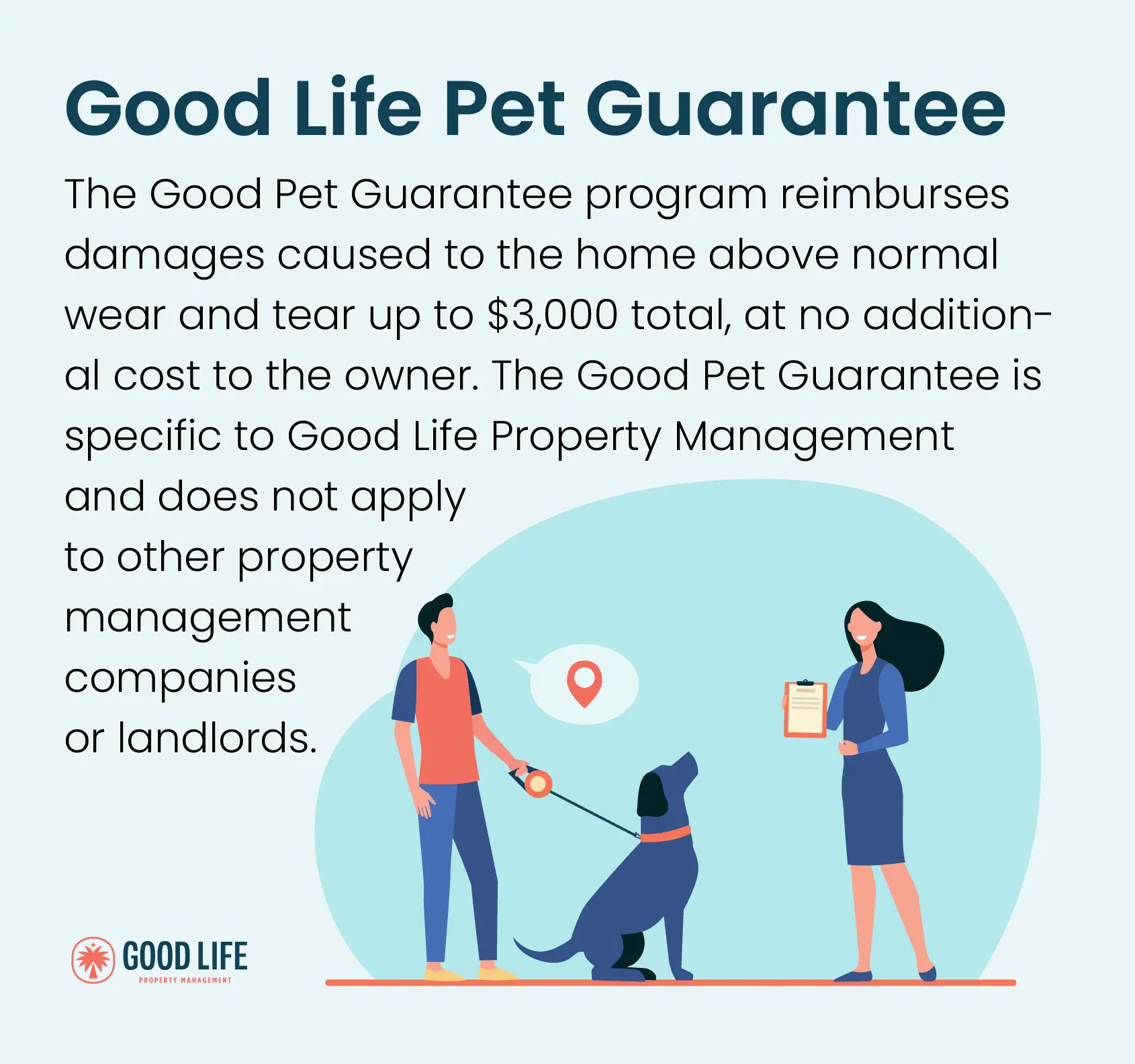Service Animals & Emotional Support Animals: What Landlords Need to Know
Updated: September 25, 2023
When screening applicants for your rental property, you may run across one who notes they have an assistance animal. Whether it’s an emotional support animal or service animal, they are both protected by law. The most important thing you need to know is that they are not pets. These are animals that work. They provide emotional or additional assistance to people with disabilities.
People often assume that these two animals are the same. While they are both protected by the law, there are important differences to note.
Disclaimer: Please check with your attorney regarding all matters pertaining to assistance animals. This blog is general in nature and should not be relied upon without checking with your attorney.
Table of Contents
- Service Animals
- Service animal requirements
- Emotional Support Animals (ESAs)
- Emotional support animal requirements
- Support Animals and Housing Laws
- Verification of a service animal
- Do landlords have to accept emotional support animals?
- Are emotional support animals service animals?
- Can you ask for proof of a service dog?
- Emotional support animal documentation
- AB 468
- Good Pet Guarantee
- Common Questions Regarding Service Animals
Service Animals
A service animal is a dog of any size or breed that has received individualized training to perform work or tasks that benefit disabled individuals, including people with physical, sensory, psychiatric, intellectual, or other mental disabilities. By law, service animals are permitted to accompany disabled individuals where any other public member is allowed to go.
Common reasons for a service animal include:
- Blindness
- Deafness
- Wheelchair-bound individuals
- Being prone to seizures
You might recognize a service animal by the vest they are wearing, usually labeled “service dog” or something similar to that. Service animals are allowed entry anywhere that their owners are, provided that it is safe. This includes buses, airports, workspaces, planes, and stores.
Service animals are working animals and are, therefore, not considered pets. Since 2011, only dogs have been nationally recognized as service animals. Still, the ADA states that miniature horses may also be considered service animals under a separate provision and in exceptional cases.
Service Animal Requirements
While there is no specific legal requirement for the amount or kind of work a service animal must provide, it must be able to perform tasks directly related to their owner’s disability. For example, service animals may alert individuals of seizures, remind their handlers with depression that they need to take medication, or retrieve objects for a person who uses a wheelchair. However, if the dog were to provide comfort with its presence, it would not be considered a service animal by the ADA.
Although some states have broader definitions and qualifications for service animals, most states hold the same requirements for service animals, including:
- The service animal must be trained to perform a task for a person with a disability, whether it be physical or mental
- The service animal must always be controlled by its owner or handler. If the handler cannot use a leash or harness, they must be able to control the service animal through other means such as voice or signals.
- Service animals must be allowed in businesses and non-profit organizations open to the general public, regardless of their pet policy.
- Service animals are not required to wear specific collars, vests, or identification tags indicating that they are service animals.
- Handlers of service animals are not required to explain their disability, show medical documentation or show training documentation for their service animal. Additionally, staff members of commercial establishments or businesses can only ask what service the animal provides and whether the service animal is required for a disability.
Service animals in California
- A mental disability can be a mental or psychological disorder or condition that severely impedes a person’s quality of life and activity (emotional illness, learning disabilities, post-traumatic stress disorder, and cognitive disabilities)
- A physical disability can be any disorder or condition that limits a person’s motility, life activity, and major body systems.
In addition to allowing service animals in places where the general public is allowed to be, California also enables individuals with disabilities to take their service animals to medical facilities (hospitals, clinics, clinician offices, etc.) and onto any public vehicles regardless of whether they are public or private (trains, buses, streetcars, boats, motor vehicles).
While dogs in training are not considered service animals by the ADA, the California Disabled Persons Act permits trainers or persons with disabilities to bring dogs-in-training to any public place as long as they are being trained to provide services related to a disability in that public space. The state of California also allows the handlers themselves to train their service animal.
Emotional Support Animals (ESAs)
Emotional support animals (ESAs) are companion animals that provide support, comfort, and assistance to individuals with emotional or mental disabilities, such as depression, anxiety, and post-traumatic stress (PTSD). In general, emotional support animals provide individuals with a better quality of life through companionship and comfort rather than providing services or performing tasks for their handler.
Emotional support animals have more restrictions in public spaces. If a retail store states that there are no pets allowed, this applies to emotional support animals. There is no official registry for ESAs. Some pet owners seek out private companies to provide documentation, but this does not guarantee them any additional rights or protections.
However, both emotional support animals and service animals are protected by housing laws.
Emotional support animal requirements
- Emotional support animals are not required to be trained to perform specific tasks that aid a person with their disability.
- Although emotional support animals do not require specific training, they are still expected to be docile, not threaten others, and show good behavior.
- The ADA does not recognize Emotional support animals as service animals and are therefore not granted the same legal rights as service animals. However, owners of emotional support animals still have rights protected by federal laws in every state.
- Emotional support animals can be any type of pet, such as dogs, cats, rabbits, etc.
- Emotional support animals are referenced by the Fair Housing Act (FHA) and the Air Carrier Access Act (ACAA), which illustrates a person’s right to have emotional support animals at home and during travel.
Emotional Support Animals California
- Individuals with disabilities cannot bring emotional support animals to all public places.
- Unlike service animals, emotional support animals cannot be granted access to public areas that do not allow pets.
- California’s Fair Employment and Housing Act requires landlords to allow a person with a disability to live with their emotional support animal in a rented apartment or home, regardless of their pet policies.
Support Animals and Housing Laws
Because emotional support animals and service animals are not considered pets, you cannot charge a pet rent or pet deposit. Even if you don’t want pets in the home, you must allow for service animals and support animals. You also cannot discriminate against specific breeds.
The only circumstances in which you may deny a support animal is if the animal would be a threat to the health and safety of others. We don’t recommend using these reasons, however. Disability complaints are one of the most common complaints the fair housing office receives and it’s very unlikely that things will work out in your favor. You could end up having to pay heavy fees for unreasonably denied service animals.
Occasionally you might do a walkthrough inspection and find an animal at the property, even though there isn’t one listed on the lease. The tenant might tell you it’s an emotional support animal. California law says the tenants are not required to disclose their need for an assistance animal. You can request a verification letter any time, so if this should happen, ask for the letter from a qualified professional.
Verification of a Service Animal
If the disability is visibly apparent, no verification is needed for the service animal. Do not ask the tenant what their disability is if this is the case. If a person says that they have an emotional support animal but there is not an obvious disability, you may ask the tenant for written verification.
The letter simply need state that the person in question is required to have a service animal. People that can verify this need are as follows:
- Doctor or health professional
- Peer support group (such as Alcoholics Anonymous)
- A non-medical service agency
- Reliable third party (caregiver, family member, etc.)
- Self-verification
The Housing and Urban Development and Department of Justice have not clearly outlined what self-verification entails. Essentially, should a disabled person provide a letter written by themselves for verification, this letter should be able to stand up in court.
For example, if a person provides a statement that says something along the lines of “I have a medical condition and require a service/emotional support animal,” they should be able to verify that in a court of law. Verification could be the doctor’s name that diagnosed you and when you were diagnosed. We recommend that if a tenant provides you with a self-verification letter, seek additional verification and speak with your attorney.
Do landlords have to accept emotional support animals?
Yes. Federal and State law prohibits landlords and housing providers from rejecting or discriminating against people with disabilities and any accommodations they may require. These accommodations include a service animal or an emotional support animal.
The only circumstances in which landlords can deny emotional support or service animals include:
- When the emotional support animal is dangerous or have a history of attacking others
- If the emotional support animal infringes on rights of other tenants by causing allergies
- When housing the emotional support animal is physically impossible or difficult (particularly in small units or if the animal is particularly large)
- When the tenant’s letter from their mental health provider is expired, although landlords may be flexible in allowing tenants to update their documents
Are emotional support animals service animals?
Can you ask for proof of a service dog?
- Is your animal a service animal?
- What tasks has the animal been trained to perform?
Emotional support animal documentation
AB 468
As of January 1, 2022, there is a new law in California that seeks to address the issue of people misrepresenting their emotional support animals as service animals. It also intends to stop businesses that provide ESA certificates, ID cards, vests, etc. from misleading people into thinking that emotional support animals are the same as service animals.
The first part of this law states that any business that provides dogs as emotional support animals will now be required to provide a statement acknowledging that the animal does NOT count as a service animal and that representing the dog as a service animal is illegal. The same statement must be provided by businesses that sell ESA certificates, ID cards, and vests.
The other part of the law states that an official ESA letter is required to prove to a landlord or other relevant parties that the animal is an emotional support animal. The letter must be from a Licensed Mental Health Professional and that person must meet the following requirements:
- They must hold a legitimate and active license. The license number, the effective date, their jurisdiction, and the type of professional license must be included in the letter.
- They must be licensed to provide professional services within the scope of the license in the jurisdiction in which the documentation is provided.
- They must establish a professional relationship with the client at least 30 days before providing the ESA letter.
- They must conduct a clinical evaluation of the client to assess their need for an emotional support animal.
- They must provide a verbal or written notice to the individual similar to the sales notices explained above – stating that an emotional support animal does not qualify as a service animal, and that misrepresenting the support animal as a service animal is against the law.

Good Pet Guarantee
- The Good Pet Guarantee program reimburses damages caused to the home above normal wear and tear up to $3,000 total, at no additional cost to the owner
- The Good Pet Guarantee is specific to Good Life Property Management and does not apply to other property management companies or landlords.
- The program is designed to encourage pet-friendly rentals and provide pet owners peace of mind.
- Good Life Property Management also offers a satisfaction guarantee for property management services, which refunds up to one year of paid monthly management fees if the client is unhappy with the service in the first year.
Common Questions Regarding Service Animals
According to the Department of Housing and Urban Development, landlords cannot deny an emotional support dog based on breed, size, or weight. The Fair Housing Act (FHA) requires landlords to make reasonable accommodations for tenants with disabilities, including those who require an emotional support animal.
No, you cannot directly ask the tenant why they need a service or support animal. You can request a verification letter if it’s an emotional support animal. Should you feel the letter is not legitimate, you can seek further verification with a reasonable accommodation form.
No, they do not. While most service animals are formally trained, a landlord or property manager need not confirm this. Emotional support animals do not require training.
No, because a service animal is not a normal pet. The rule that you will not accept specific breeds (i.e. husky, American bulldog, etc) does not apply to them. The HUD states that breed, weight, and size limits do not apply to service animals. If you feel this animal would cause harm to those around it, you can deny it. We strongly advise against this.
No, mandatory registration of service animals is not allowed under the ADA. However, service animals are subject to the same licensing and vaccination rules that are applied to all dogs.
If you found this article helpful, follow us on social media. We post daily tips to help you manage your own rental property:
Steve Welty
Subscribe to our Weekly Newsletter
Join the 5k+ homeowners receiving Local Law Updates and Landlord Tips. Delivered to your inbox every Saturday at 6am PST.
Share this:
Get in touch with us:
We make owning rental property easy.

Pro Services
Tired of headaches?
We got you covered.
Choose Your Next Step
Good Life Blogs
We believe that education is empowering.

SB 52: California May Ban AI Rent Pricing Tools
California’s SB 52 could ban landlords from using AI to set rent prices. Learn how this bill may impact your rental business and what actions you can take.

Trash Collection Fees Coming to San Diego Rental Properties
Trash collection fees are coming to San Diego landlords. Learn who’s affected, how much it will cost, and how to stay compliant.

How to Turn Vacant Rental Properties into Tax Deductions
Learn how to turn your rental property’s vacancy into potential tax deductions. Discover the rules, strategies, and tips landlords need to know.






